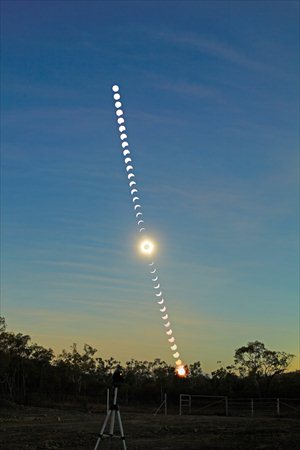With stars in their eyes
A group of Chinese tourists swarmed into Cairns this month, among the 100,000 visitors to the attractive north-east Australian seaside town that week. Ordinarily Cairns has a population of 153,000 and is famous for its beaches and friendly tropical atmosphere.
But these tourists weren't there for the beaches, the nearby Great Barrier Reef or to visit the stunning neighboring Daintree Rainforest.



They wanted to look at the sun disappearing during a total solar eclipse, which could only be viewed from parts of the Southern Hemisphere.
For the 22 Chinese members in the group it was the first time any of them had left their home country to view a major astronomical wonder.
Organizer Tang Haiming enthusiastically explained the appeal of the phenomenon. "It's a stunning experience, not just visual. During the few minutes the sun is in shadow in the middle of day, the temperature drops, the air around you cools down, you can feel the breeze. Then you see stars sparkling beside the sun. It's amazing."
Eclipse tours
Tang is also the supervisor of scientific promotions at the Shanghai Astronomical Observatory's Sheshan Station, which has organized eclipse tours in recent years for enthusiasts. "Although this is the first time we have chased an eclipse overseas, the tours have been very popular for years."
In the past five years, the station has organized two eclipse tours in China, including one to the Xinjiang Uyghur Autonomous Region. But this was different.
"We didn't want to be shallow tourists who just went abroad to buy luxury items. We wanted this trip to have a real purpose. It was a bit like Olympics tourism. You visit the place of the event and experience it to the full along with the culture and natural attractions," Tang said.
Going abroad to look at an astronomical wonder does not come cheaply. It cost each member of the group more than 27,000 yuan ($4,335) for the 10-day trip, a lot more than a standard tour to the same area.
"Our members have to be able to afford the airfares, accommodation and food, but this has become more acceptable in recent years with people earning more," Tang told the Global Times. "And with the development of the travel industry, more routes and better services are available, which all helped us organize this event."
There was a lot of preparation involved. In March an advance party checked out Cairns to see if it would be a suitable site. Eventually the group settled on viewing the eclipse from York Beach, which was also the location selected by many other international observers.
After the advance party returned they wrote a report and posted this online where it was read by astronomy fans around the world. "It was incredible when someone came up to me in Cairns and asked me whether I was from the Qimingxing Alliance," Tang said.
The Qimingxing Alliance is made up of amateur astronomers from the Shanghai Astronomical Society. It was founded in 2001 and has more than 300 members.
Li Ying is a full-time taobao shopkeeper as well as an amateur astronomer. She took her husband and 7-year-old daughter to Australia to see the eclipse with her. It was a family outing.
"I'm more into meteor showers. I went to Yinchuan in the Ningxia Hui Autonomous Region to see a meteor shower with the group last year, and this year I chased the sun with them. One of my friends told me that my values would be changed after watching a solar eclipse. I was looking forward to being challenged."
Unlike ordinary tourists, this group did not make its first stop at the Sydney Opera House, but instead went to the 154-year-old Sydney Observatory. Later they visited Uluru (Ayers Rock) to view the night sky.
They certainly didn't travel lightly. These tourists bring a lot of equipment with them. Yu Jun carried two single-lens reflex cameras, five lenses, two tripods, and an 80-millimeter telescope with him. Before boarding their flight they had to rearrange their backpacks to balance the weight.
"I had to take a one meter telescope with me for our live online broadcast in Xinjiang in 2008, which needed a lot of explaining for officials. I had to carry a letter of authorization with me all the time," Tang said.
Unpredictable aspects
Solar eclipses are very predictable and astronomers know when they will occur - in March 2016 a solar eclipse will be best seen in Southeast Asia, and in 2017 there will be another which will be viewed in the US. But there are unpredictable aspects for eclipse chasers.
The Qimingxing Alliance members in Cairns suddenly learned the night before that there might be rain during the eclipse. Most chose to stay in Cairns. "We couldn't leave because we didn't know for sure that we would be able to find another suitable viewing site," Tang said. Sadly just after the moon started creeping across the face of the sun, rainclouds obscured the event, only beginning to drift away when the sky started to lighten again.
However Yu Jun decided to take the risk and moved away from Cairns.
"We discovered that the weather would not be ideal and that the eclipse might be obscured by clouds. We looked at the weather charts and reckoned that these clouds formed over the ocean and moved inland as they dispersed. So we decided to go inland where the viewing conditions might be better," Yu said.
He and three others rented a car and drove through the night eventually arriving 150 kilometers away in the middle of nowhere. There were no cellphone signals and they could not contact the others in their group.
"You can't afford to wait for the wonder of an eclipse." Yu remembered well that in 2009 many Shanghai observers stayed in the city to view that eclipse only to see it totally obscured by heavy rain and clouds.
Yu has now observed three solar eclipses. An astronomy major in graduate school and a science editor, Yu loved looking at the stars when he was young and grew up fascinated with the subject.
He has traveled through the country to view different phenomena in the sky. He has grown accustomed to looking over weather forecasts, then carefully choosing the best site and flying there. "With eclipses in another country it's more of a risk because you have to set your schedule far in advance and it's hard to change things once you arrive there."
He caught the eclipse but there was a downside: with all the tourists crowding into Cairns for the event, all the normal tourist activities were booked out, and his plans to go diving on the Great Barrier Reef had to be shelved.
"A solar eclipse is an extraordinary event, amazing and addictive. But there are only a few eclipses in the world every year and I chase them if I can," Yu said.
Tang keeps an eclipse score: to date he has one win, one loss and one draw. Australia counted as a draw because they could watch much of the eclipse except for the opening stages.
"In 2009 I missed the eclipse because I had to stay at the Yangshan Deep Water Port for a live broadcast. That was hard for me," Tang said. He knew it would rain in Shanghai but he could not fly to Chongqing, where most of the enthusiasts gathered, because he had to take part in a broadcast that he had organized.
"We will make better back-up plans for future events. We can include plans to transfer elsewhere if there is bad weather with our travel agents."
Li Ying was philosophical about missing the eclipse -"It was nice to go abroad and have time with my family. However my values are unaltered."
Lucky enthusiasts
The Australian eclipse tour organizer Tang has been a keen amateur astronomer for many years. In 2004 he had been working for a Fortune 500 company for four years but was finding himself bored by the daily routine. He had been helping plan events at the Shanghai Astronomical Observatory in his spare time but then he was approached by the observatory's head and offered a job there, which paid just half his then wage. He took the new job quickly.
"Astronomy enthusiasts in Shanghai are lucky because there are only a few observatories in the country and one's here in the city," Tang said.
He launched a website for enthusiasts and began organizing tours to view special events. "It's not that I want everyone to love astronomy, but if people are interested, we can offer them knowledge and resources."
Astronomy has many aspects. Tang was once approached by a man who wanted him to help design his apartment to make sure he had a perfect view of the moon every Mid-Autumn Festival. He agreed and did some calculations to ensure the apartment windows faced the right way. "It was fun for me and it's nice to see people are interested in astronomy.
"We will organize more tours to observe eclipses and other phenomena. The next total solar eclipse will happen on November 3 in 2013 and this will be even more special because it's a rare hybrid eclipse that will be seen in west Africa. We will start making preparations but will have to wait to decide whether we can actually go there."